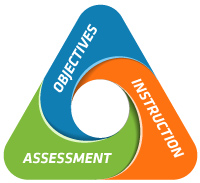The SFL has 12 core working offices and unit representatives:
(1) Curriculum Office including six Level Coordinators (A2, B1, B1+, B2, B2+, C1 levels)
(2) Distance Education Office
(3) Continuing Professional Development Office
(4) Testing Office
(5) Statistical Analysis Office
(6) Lesson Schedule Office
(7) Translation and Communication Office
(8) Library Office
(9) Student Activities Office
(10) Foreign Instructor Recruitment Office
(11) Quality and Accreditation Office
(12) Website Data Entry and Control Office
(13) Other units (Students with Disabilities, Exchange Programs, Lifelong learning, etc.)
There is also Exam Appeals Commission established to act when needed. The body of an office consists of a coordinator and member instructors. Each office conducts meetings when necessary throughout the academic year for the instructors and their team members. During the meetings, instructors are provided the chance to exchange their views, reflect on teaching practices, and offer suggestions for improving the program. Before the meeting, each participant receives an email concerning the items to be discussed in the meeting, thus providing participants the time and opportunity to prepare for the meeting. During the meeting, a note-taker is assigned to record the minutes of that meeting. After the meeting, the participants sign the meeting minutes form, and the note-taker prepares a final report summarizing the meeting. Both the meeting minutes form and the summary reports are saved in a shared drive that is easily accessible to all instructors from their offices.
Office coordinators are responsible for maintaining the quality of their respective courses through activities such as the preparation of the syllabi and other materials. They are also expected to devise action plans to resolve any issues they may notice with the course. To maintain quality standards and ensure a smooth workflow, coordinators should assign tasks to and work collaboratively with their team members.
Norming sessions are held to ensure agreement on the implementation of performance standards, particularly with respect to the evaluation of student performance. During the norming sessions in which a rubric and sample files of student work/audio recordings are distributed to the instructors, the instructors grade the work/audio sample and discuss the reasons for their assigned scores. The purpose of these sessions is to reach a consensus on the rubric's interpretation and minimize the gap in scoring differences between instructors.
Because the SFL seeks to maintain high-quality standards, it administers an Office Feedback Survey at the end of each semester for instructors to evaluate the workflow and standards of communication within each office. These surveys are designed to provide feedback on the coordinators for the improvement of the education at the SFL. Through these feedback forms, instructors have the chance to voice their thoughts concerning the office and their respective skill courses.
Following the completion of the academic year, coordinators prepare and present documents concerning their offices, including an evaluation of the extent to which course objectives were met throughout each quarter.


